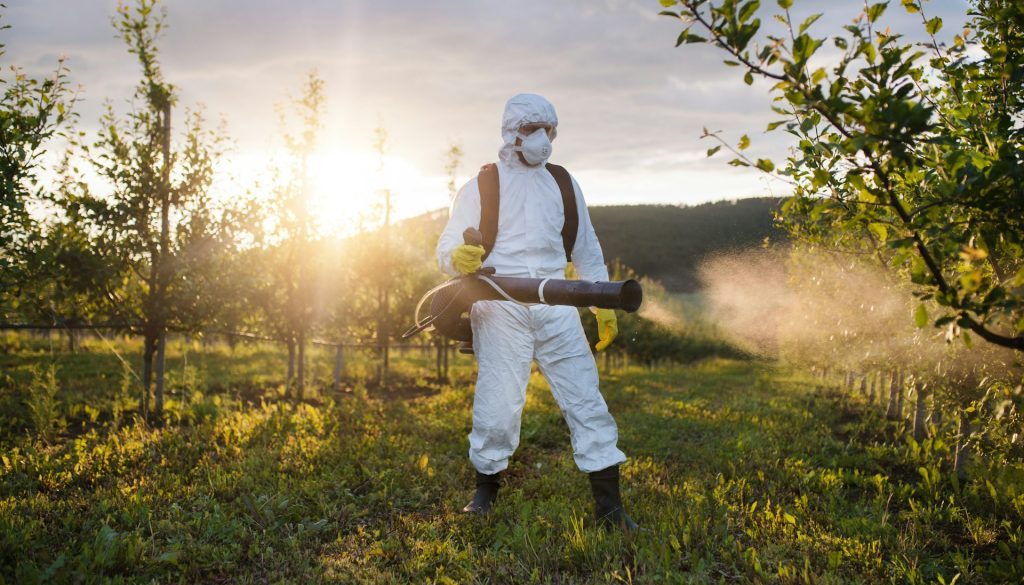Handling hazardous waste, especially from pesticides, is critical not only for protecting our environment but also for ensuring the safety and health of our communities. When pesticides are disposed of improperly, they can cause severe damage to ecosystems, contaminate water supplies, and pose health risks to humans and wildlife. Recognising the importance of this issue is the first step in managing hazardous waste effectively.
Pesticides, while essential for maintaining healthy gardens and farms, contain chemicals that can lead to significant environmental harm if not disposed of correctly. These substances can leach into the soil and waterways, affecting plant and animal life. In Cheshire, where agricultural activities are prevalent, understanding the dangers associated with improper pesticide disposal is necessary. This guide will help you identify hazardous pesticide waste and provide practical advice on how to handle and dispose of it responsibly.
Identifying Hazardous Pesticide Waste
Before you can properly dispose of pesticide waste, it’s crucial to identify what qualifies as hazardous. Typically, pesticides that are outdated, banned, or no longer needed fall under this category. Many common lawn and garden pesticides contain active ingredients that become hazardous waste when they exceed their shelf life or are surplus to requirements. Look for these indications to identify hazardous waste:
– Expired or Banned Pesticides: Check the expiration dates on pesticide containers. Expired products can become unstable and more harmful. Similarly, if certain pesticides are banned due to their harmful effects, they should be deemed hazardous.
– Sealed or Unused Containers: Pesticides that have been stored but remain unused may also qualify as hazardous, especially if they are no longer suitable for intended applications.
– Contaminated Equipment: Items used to apply these pesticides, such as sprayers or protective clothing, may also be classified as hazardous waste if contaminated.
Recognising damaged or leaking containers is another essential aspect of identifying hazardous waste. Inspection of storage areas for spills or leaks will provide clues regarding hazardous conditions. Once identified, these materials should not be left to degrade or leak further. Keeping a keen eye on what constitutes hazardous pesticide waste ensures you take the appropriate next steps in storage and disposal, safeguarding both the environment and community health.
Safe Storage and Handling Tips
Storing and handling pesticides safely is key to preventing accidental spills and contamination. Correct storage involves keeping these chemicals in a dedicated area, away from children, pets, and food. Look for a cool, dry place, ideally with good ventilation, to store them. Avoid exposure to direct sunlight, as it can degrade the pesticide, making it even more hazardous.
When handling pesticides, it’s important to wear appropriate protective gear. This includes gloves, goggles, and a mask to safeguard against splashes and fumes. Always follow the manufacturer’s instructions on the label for mixing and using these chemicals. Don’t transfer pesticides into unlabelled containers, which can lead to dangerous mix-ups. Instead, maintain the original packaging and ensure it’s securely closed when not in use.
Another fundamental step is regular inspection. Check pesticide containers for any signs of leaks, damage, or wear. If you notice cracks or damages, transfer the pesticide to another suitable container, clearly marked and safe for chemical storage. Do not pour leftovers down drains or into rubbish to prevent contamination of water and soil.
Proper Disposal Methods
When it comes to disposing pesticides, using designated hazardous waste facilities is the safest route. These centres are equipped to handle and process toxic materials correctly. In Cheshire, there are specific local regulations that govern how pesticides should be disposed of. Familiarise yourself with these rules to ensure compliance.
Here’s a simple guide to help with the disposal process:
1. Identify Local Facilities: Find out which waste facilities in Cheshire accept hazardous materials. Contact them in advance to understand their requirements and services.
2. Preparation for Drop-off: Keep pesticides in their original containers if possible, and ensure they are sealed securely. Clearly label any transferred contents.
3. Transport Safely: When taking hazardous waste to a disposal facility, pack them upright in a cardboard box to prevent spills. It’s best to transport them during cooler parts of the day.
4. Follow Facility Guidelines: Upon arrival, adhere to all the facility’s instructions for dropping off hazardous materials. They might provide specific bins or spots for disposal.
Hiring Professional Help for Disposal
Sometimes, dealing with hazardous waste on your own can feel overwhelming. That’s when hiring professional services can make all the difference. Specialists in hazardous waste disposal can manage the task efficiently, ensuring every step complies with safety standards.
In Crewe, there are several skip hire options for those needing to dispose of waste quickly and efficiently. Exploring skip hire prices and options could offer you a convenient solution. By opting for service professionals, you’ll not only streamline the process but also mitigate any potential risks associated with handling hazardous waste.
Ensuring Environmental Safety
Proper disposal of pesticides is about more than just following rules. It’s about contributing to the protection of our planet. By ensuring these hazardous substances are disposed of correctly, you help preserve natural habitats and safeguard community health.
Looking ahead, consider reducing the amount of pesticide waste generated. Opt for environmentally-friendly alternatives where possible and purchase only the amount necessary, to avoid overstocking. Engaging in regular waste audits can also help identify unnecessary stock and prevent chemical buildup, promoting a healthier environment for all.
Taking small, informed actions in managing hazardous pesticide waste can have a big impact on the environment. With the right knowledge and careful handling, we can protect our surroundings today for a better tomorrow.
Ensuring proper disposal of hazardous waste is a step we can all take towards protecting the environment. If you need a practical way to manage this kind of waste, take a look at our available options and learn how to do it responsibly. Explore skip hire prices in Crewe with Enviro Skip Hire to find simple and affordable solutions that suit your needs.




